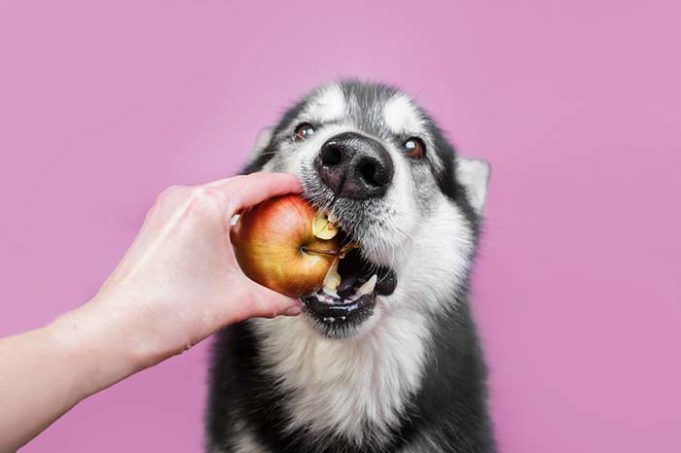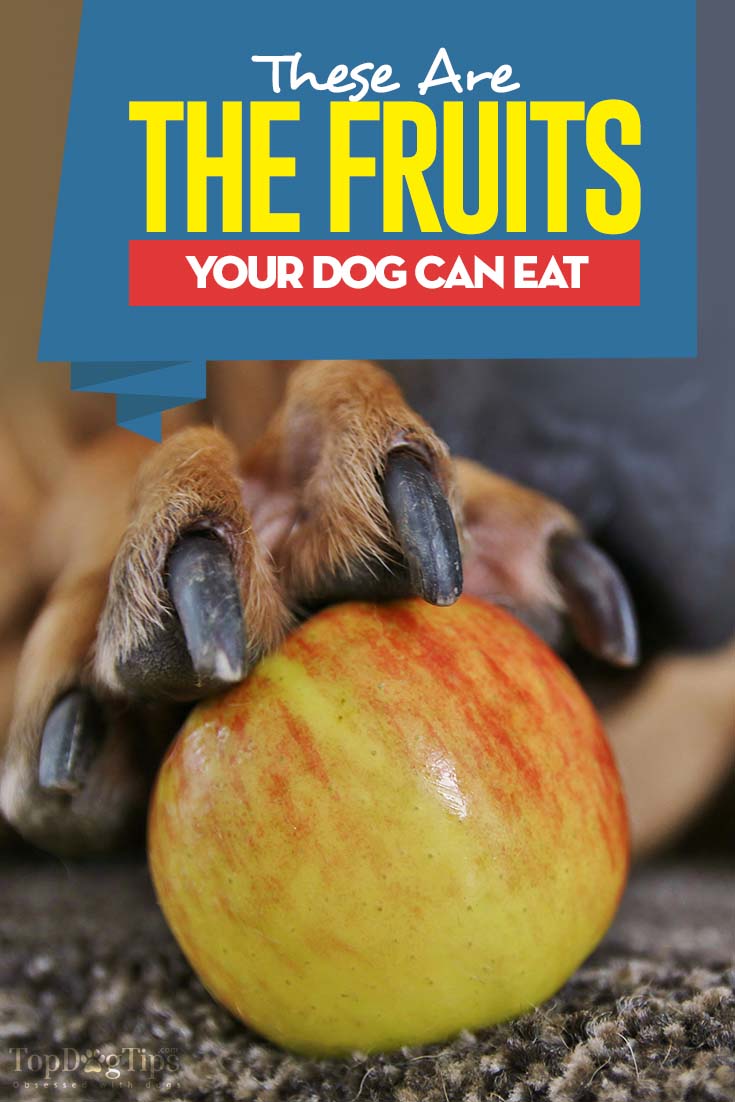Most dogs enjoy eating certain fruits and vegetables. While meat should be the primary part of your dog's diet, there are many proven benefits dogs receive from plant foods. Commercial dog foods often include both fruits because they provide antioxidants, aid in digestion, boost immunity, improve eyesight and help with dog's skin and coat health. So what fruits can dogs eat and what can you give them as a treat in moderation?
Apples
Apples are a  great source of potassium, phytonutrients, fiber, Vitamin C and other nutrients for the dog. However, core and seeds contain arsenic, which is toxic to dogs so only feed your pup peeled apple flesh. Apples can also refresh your dog’s breath. Half of apple is a good portion size for any pooch.
great source of potassium, phytonutrients, fiber, Vitamin C and other nutrients for the dog. However, core and seeds contain arsenic, which is toxic to dogs so only feed your pup peeled apple flesh. Apples can also refresh your dog’s breath. Half of apple is a good portion size for any pooch.
Pears
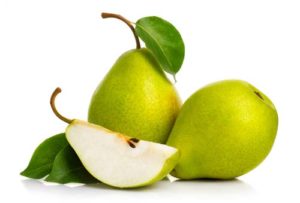 Pears contain Vitamin C, A, and plenty of fiber. Served in moderation, they make a great snack for dogs and your pooch is likely to enjoy the sweet taste. Similar to apples, keep pear seeds away from your dog since they contain small traces of cyanide. Pears may help promote anti-cancer properties though this hasn't been tested in dogs yet.
Pears contain Vitamin C, A, and plenty of fiber. Served in moderation, they make a great snack for dogs and your pooch is likely to enjoy the sweet taste. Similar to apples, keep pear seeds away from your dog since they contain small traces of cyanide. Pears may help promote anti-cancer properties though this hasn't been tested in dogs yet.
Plums
Plums are 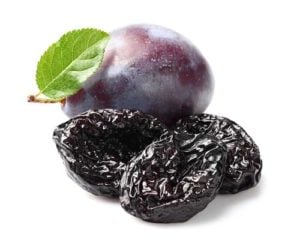 good for dogs but you must remove the pit first since just like pears it contains cyanide and it can also lead to choking or intestinal blockage if swallowed by the dog. The main benefit of plums for dogs comes from the high amount of water (they are made of 87% water), so they can be another way to keep your dog hydrated when he refuses to drink water. They also contain a decent amount of Vitamin C.
good for dogs but you must remove the pit first since just like pears it contains cyanide and it can also lead to choking or intestinal blockage if swallowed by the dog. The main benefit of plums for dogs comes from the high amount of water (they are made of 87% water), so they can be another way to keep your dog hydrated when he refuses to drink water. They also contain a decent amount of Vitamin C.
Apricots
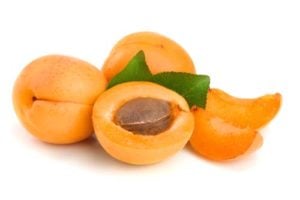 Apricots, while safe and healthy, are another type of fruit which should be given to dogs with extreme caution because apricot pits, leaves and stems are all toxic to dogs. If you are careful, your dog will certainly enjoy this tasty treat full of beta-carotene and potassium. Dried apricots are also healthy for your dog (as long as they do not contain any added sugar or other filler), in moderation.
Apricots, while safe and healthy, are another type of fruit which should be given to dogs with extreme caution because apricot pits, leaves and stems are all toxic to dogs. If you are careful, your dog will certainly enjoy this tasty treat full of beta-carotene and potassium. Dried apricots are also healthy for your dog (as long as they do not contain any added sugar or other filler), in moderation.
Peaches
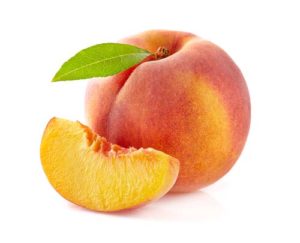 Once again, beware of the pit since it is toxic to dogs. Also avoid canned peaches since they are high in sugar and preservatives, which can cause your dog stomach discomfort without adding anything to the nutritional value. Other than that, dogs love peaches and this fruit is a great source of fiber and Vitamin A.
Once again, beware of the pit since it is toxic to dogs. Also avoid canned peaches since they are high in sugar and preservatives, which can cause your dog stomach discomfort without adding anything to the nutritional value. Other than that, dogs love peaches and this fruit is a great source of fiber and Vitamin A.
Oranges
Oranges are 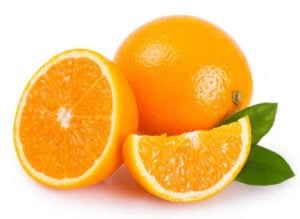 a great source of calcium, potassium, fiber, iron, folic acid and many vitamins. Dogs usually love oranges, as well as other fruits in that family such as tangerines and clementines, but you shouldn’t give your dog more than half of a segment at a time since citrus fruits have citric acids which can cause gastrointestinal upset in dogs. Make sure to remove the seeds as well, and, of course, peel it beforehand.
a great source of calcium, potassium, fiber, iron, folic acid and many vitamins. Dogs usually love oranges, as well as other fruits in that family such as tangerines and clementines, but you shouldn’t give your dog more than half of a segment at a time since citrus fruits have citric acids which can cause gastrointestinal upset in dogs. Make sure to remove the seeds as well, and, of course, peel it beforehand.
Mangoes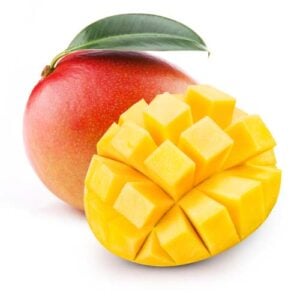
Mangoes are packed with vitamins and can help your dog with digestion. Their sweet taste is very appealing to dogs too. Remove the skin and the pit before you feed your pet and stick to small portions. Large amounts of natural sugars and fiber from mango may upset your dog’s stomach and digestive tract.
Pineapple
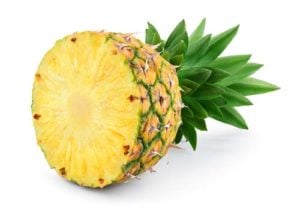 Pineapple is bursting with many different vitamins, minerals and other important nutrients, including zinc and folate. It can aid your dog’s digestion and improve his immune system when given in very small amounts. However, it is also very high in natural sugars and citric acid, so keep the portions small in quantity. Remove the skin and the hard core before you feed your dog with small chunks of pineapple.
Pineapple is bursting with many different vitamins, minerals and other important nutrients, including zinc and folate. It can aid your dog’s digestion and improve his immune system when given in very small amounts. However, it is also very high in natural sugars and citric acid, so keep the portions small in quantity. Remove the skin and the hard core before you feed your dog with small chunks of pineapple.
Kiwi
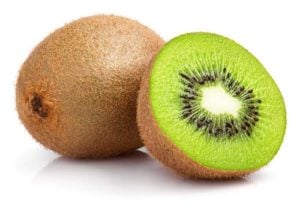 Kiwis are high in Vitamin C and they are a good source of potassium and fiber for the dog. Similar to other fruits that are highly concentrated in sugars and citric acid, make sure to slowly introduce kiwi, in very small portions. Also, its high fiber content can have a laxative effect on the dog. Peel the skin before you give kiwi to your pup and get rid of seeds as well.
Kiwis are high in Vitamin C and they are a good source of potassium and fiber for the dog. Similar to other fruits that are highly concentrated in sugars and citric acid, make sure to slowly introduce kiwi, in very small portions. Also, its high fiber content can have a laxative effect on the dog. Peel the skin before you give kiwi to your pup and get rid of seeds as well.
Watermelon
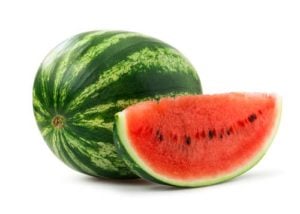 Dogs love watermelon, especially a cold piece on a hot summer day. Since watermelon is basically 92% water, feeding it to your pooch is a great way to keep him hydrated too. It also has Vitamins A, C, and B-6 and potassium which can help with nerve functions and maintaining healthy muscles. Be very careful about watermelon seeds or rind and stick to a couple 1-inch pieces for portion size.
Dogs love watermelon, especially a cold piece on a hot summer day. Since watermelon is basically 92% water, feeding it to your pooch is a great way to keep him hydrated too. It also has Vitamins A, C, and B-6 and potassium which can help with nerve functions and maintaining healthy muscles. Be very careful about watermelon seeds or rind and stick to a couple 1-inch pieces for portion size.
Cantaloupe
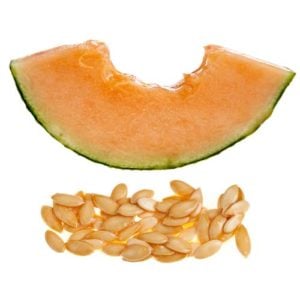 Full of important vitamins and minerals, cantaloupe fruit can help with inflammatory issues in dogs. It also contains fiber, potassium, thiamine, magnesium and beta-carotene. Remove the skin and seeds before you feed your dog a piece of cantaloupe and don’t let your pooch lick the outside skin since it may contain harmful bacteria. Keep the portions to one-inch wedges.
Full of important vitamins and minerals, cantaloupe fruit can help with inflammatory issues in dogs. It also contains fiber, potassium, thiamine, magnesium and beta-carotene. Remove the skin and seeds before you feed your dog a piece of cantaloupe and don’t let your pooch lick the outside skin since it may contain harmful bacteria. Keep the portions to one-inch wedges.
Pumpkin
Pumpkin is 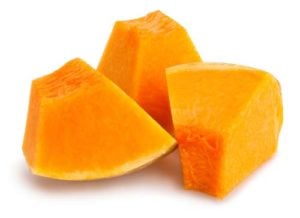 a rich source of alpha and beta-carotene, fiber, iron, zinc, potassium and Vitamin A and it's one of the most popular natural treats among dogs. The best way to feed your dog pumpkin is without pumpkin seeds and to serve them unsalted, roasted and grounded. Other parts of pumpkin have sharp hairs, like stem and leaves, so it is best to avoid them.
a rich source of alpha and beta-carotene, fiber, iron, zinc, potassium and Vitamin A and it's one of the most popular natural treats among dogs. The best way to feed your dog pumpkin is without pumpkin seeds and to serve them unsalted, roasted and grounded. Other parts of pumpkin have sharp hairs, like stem and leaves, so it is best to avoid them.
Blackberries
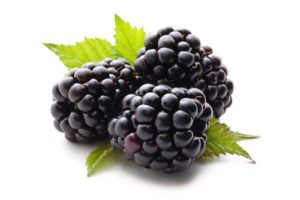 Blackberries are a good source of antioxidants, tannin, manganese, fiber, omega-3 fatty acids and folate for the dog. They also contain Vitamins A, E, C and K. Give your pooch two or three blackberries as a treat portion. Along with other berries, blackberries can protect your dog from urinary tract infections.
Blackberries are a good source of antioxidants, tannin, manganese, fiber, omega-3 fatty acids and folate for the dog. They also contain Vitamins A, E, C and K. Give your pooch two or three blackberries as a treat portion. Along with other berries, blackberries can protect your dog from urinary tract infections.
Blueberries
Blueberries is 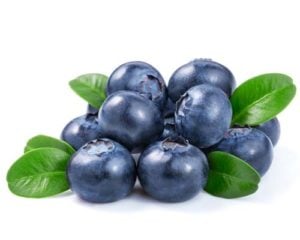 the best berry fruit you can give your dog and it's the most extensively studied fruit in scientific literature due to its numerous health benefits. They are considered to be a superfood for both dogs and humans. They are extremely rich with antioxidants, which can help your dog’s immune system and have been found to have numerous anti-cancer and anti-inflammation properties. They are also rich in fiber, Vitamin C and potassium, and have low sugar content.
the best berry fruit you can give your dog and it's the most extensively studied fruit in scientific literature due to its numerous health benefits. They are considered to be a superfood for both dogs and humans. They are extremely rich with antioxidants, which can help your dog’s immune system and have been found to have numerous anti-cancer and anti-inflammation properties. They are also rich in fiber, Vitamin C and potassium, and have low sugar content.
Cranberries
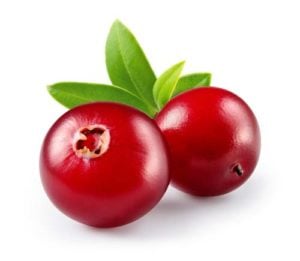 Cranberries are rich in manganese, fiber and Vitamin C. While you can give your pup some cranberries, many dogs might not like their taste due to the tartness. Also, avoid feeding cranberry juice or sauce to your dog since they are high in sugar and can cause digestion issues. Stick to raw, dried or cooked cranberries with no additives.
Cranberries are rich in manganese, fiber and Vitamin C. While you can give your pup some cranberries, many dogs might not like their taste due to the tartness. Also, avoid feeding cranberry juice or sauce to your dog since they are high in sugar and can cause digestion issues. Stick to raw, dried or cooked cranberries with no additives.
Raspberries
Raspberries are good 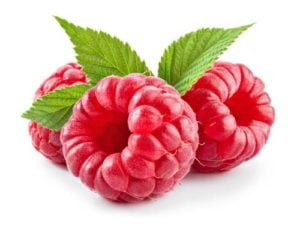 for dogs due to their anti-inflammatory properties. They are also rich in dietary fiber, potassium, copper, manganese, iron, magnesium and antioxidants. However, you shouldn’t give your pooch more than 2 or 3 raspberries at a time since they contain trace amounts of xylitol, which can be fatal to dogs in large amounts.
for dogs due to their anti-inflammatory properties. They are also rich in dietary fiber, potassium, copper, manganese, iron, magnesium and antioxidants. However, you shouldn’t give your pooch more than 2 or 3 raspberries at a time since they contain trace amounts of xylitol, which can be fatal to dogs in large amounts.
Strawberries
Unlike 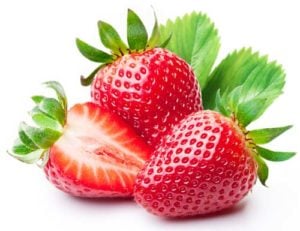 other berries, strawberries are high in sugar, so feed only small amounts to your pooch. The nutrients that strawberries contain can slow age-related health issues and strengthen your dog’s immune system. They are full of antioxidants, whether you serve them fresh or frozen. They can also be eaten pureed over your dog’s normal food.
other berries, strawberries are high in sugar, so feed only small amounts to your pooch. The nutrients that strawberries contain can slow age-related health issues and strengthen your dog’s immune system. They are full of antioxidants, whether you serve them fresh or frozen. They can also be eaten pureed over your dog’s normal food.
Cherries
Cherries are another popular 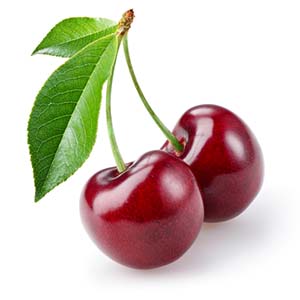 berry fruit pet owners often give to dogs either fresh or frozen. They have to be de-pitted and have the stems and leaves removed before they can be safe for dogs to consume because these parts all contain cyanide. Cherries are packed with Vitamins A and C, antioxidants, fiber and melatonin, among other nutrients, and most dogs enjoy their sweet taste.
berry fruit pet owners often give to dogs either fresh or frozen. They have to be de-pitted and have the stems and leaves removed before they can be safe for dogs to consume because these parts all contain cyanide. Cherries are packed with Vitamins A and C, antioxidants, fiber and melatonin, among other nutrients, and most dogs enjoy their sweet taste.
Banana
Bananas are 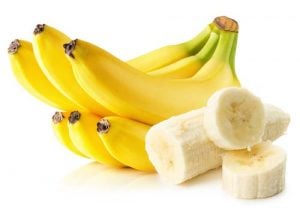 usually a hit natural treat among dogs. Potassium can improve dog's heart and kidney functions and bananas are full of it. The reason ripe bananas are loved by dogs (and people) is because they are very high in carbs and sugar, so don’t go overboard with them. Use them as an occasional natural dog treat and give your Fido one-inch-long section of banana as a portion.
usually a hit natural treat among dogs. Potassium can improve dog's heart and kidney functions and bananas are full of it. The reason ripe bananas are loved by dogs (and people) is because they are very high in carbs and sugar, so don’t go overboard with them. Use them as an occasional natural dog treat and give your Fido one-inch-long section of banana as a portion.
Coconut
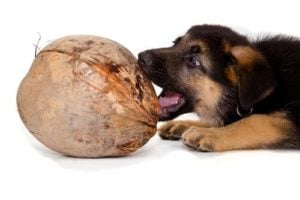 Dogs can eat small amounts of coconut meat just as they can consume a little bit of coconut oil. It does have medium chain triglycerides, which have health benefits but also can cause intestinal distress in some dogs, so introduce coconut slowly to your pet's diet. Coconut is high in fatty acids and antioxidants, which is good for your dog’s skin and coat, as well as his immune system.
Dogs can eat small amounts of coconut meat just as they can consume a little bit of coconut oil. It does have medium chain triglycerides, which have health benefits but also can cause intestinal distress in some dogs, so introduce coconut slowly to your pet's diet. Coconut is high in fatty acids and antioxidants, which is good for your dog’s skin and coat, as well as his immune system.
So what fruits can dogs eat? A huge number of them, but some are better (and safer) than others. The above mentioned fruits are great for dogs and many canines love eating these specific ones as a treat. That said, it is important to give them in moderation and to make sure that they are not harmful to your dog.
READ NEXT: 16 Healthy Human Foods for Dogs (That You Haven’t Thought Of)


